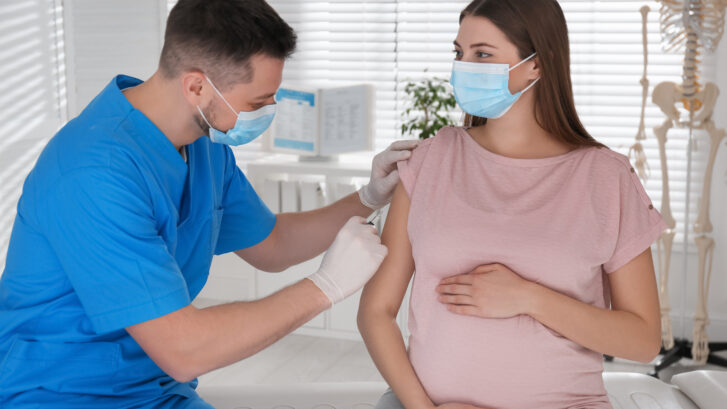Why You Need the COVID-19 Vaccine If You’re Pregnant
The original clinical trials to find a COVID-19 vaccine excluded pregnant women. Many take that to mean the vaccines are unsafe for expectant mothers.
Even though later trials with pregnant women showed the vaccines are safe for them, the incorrect beliefs persist. Many still believe it’s dangerous for the mother, it’s dangerous for the baby or it can cause infertility. None of these things are true.
Our family practice concierge doctors in Jupiter have heard a few of our pregnant patients express reservations about the vaccine based on these misconceptions. We’ve also heard some heartbreaking stories of what happened to some pregnant women who didn’t get vaccinated.
As of Oct. 2, the CDC reported only 26 percent of pregnant Americans have received at least one COVID-19 vaccine. Over 76 percent of the rest of the eligible population, however, has done so.
Faces behind the statistics
This resistance to the vaccine by pregnant women has occasionally led to tragic outcomes. This led to a record 22 maternal deaths in August alone, according to the CDC. A total of 161 pregnant women have died.
And behind these numbers are real people.
Twenty-two-year-old Emily Robison was 28 weeks pregnant and unvaccinated when she was admitted in August to Mercy Hospital in Arkansas with COVID-19. Her baby Carmen, delivered via C-section at 29 weeks, survived. Emily did not.
Then there’s 32-year-old Paige Ruiz, a Fort Worth wife, school district administrator, and mother of two. She died of coronavirus complications on August 15 within days of giving birth to a baby girl, Celeste. Paige Ruiz was unvaccinated.
On August 20, unvaccinated labor and delivery nurse Haley Mulkey Richardson, 32, of Theodore, Alabama died from COVID-19. She was seven months pregnant. Two days after, her unborn daughter Ryleigh Beth, died of the illness.
Danger for the baby
Sometimes the mother survives, but her baby does not.
Kyndal Nipper was three weeks away from her due date with a child she and her husband planned to name Jack when she contracted a mild case of COVID-19. The 29-year-old mother-to-be wasn’t vaccinated but her only symptoms were loss of the sense of smell and a fever.
“The symptoms went away quickly,” reports the Associated Press (AP), “but Jack didn’t seem to be kicking as much as he had been. She tried drinking a caffeinated beverage: Nothing. She headed to the hospital in Columbus Georgia, for fetal monitoring where medical staff delivered the news. Baby Jack was gone.”
“’He was supposed to come into the world in three weeks or less,’” Nipper told the AP. “’And for them to tell you there’s no heartbeat and there is no movement . . .’”
According to Nipper’s doctor, Timothy Villegas, testing showed the placenta was infected with the virus. It showed patterns of inflammation similar to that found in the lungs of people who died of COVID-19.
This infection is most likely the cause of the baby’s death, because he was unable to receive oxygen and nutrients, according to Villegas.
Misconceptions
All these were young, apparently healthy people, who had reservations about receiving a coronavirus vaccine.
Dr. Cheree Melton, a family medicine physician who specializes in obstetrics and teaches as the University of Alabama, spoke to the AP. She and her colleagues have seen about a half-dozen unvaccinated patients suffer either miscarriages or stillbirths due to misinformation.
“I get everything from, ‘Well, somebody told me that it might cause me to be infertile in the future,’ to, ‘It may harm my baby,’” she said.
False information, suppositions, and unfounded misconceptions have plagued the vaccines from the beginning, including in the area of obstetrics.
The facts
According to the CDC, as well as numerous studies, the vaccine does not increase the risk of miscarriage, nor will it harm the baby.
In fact, just the opposite appears to be true.
Several studies show women who receive a COVID-19 vaccine while pregnant had COVID-19 antibodies in their umbilical cord blood. Another study detected the coronavirus antibodies in their breast milk. Researchers concluded vaccinated mothers could pass protection against the coronavirus to babies both before and after birth.
And to ensure the newborn isn’t left without a mother, it’s also important to protect yourself. The World Health Organization (WHO) warned that pregnant women are at higher risk of severe cases of COVID-19 than comparable people in their age group.
The American College of Obstetricians and Gynecologists (ACOG) and the Society for Maternal-Fetal Medicine (SMFM), the two leading organizations representing specialists in obstetric care, “enthusiastically recommends” that all pregnant individuals be vaccinated against COVID-19.
The CDC offers a detailed information page, updated October 7, 2021, on what you need to know if you’re pregnant, breastfeeding, or considering becoming pregnant.
And, of course, we are available to answer any questions our patients may have.
Kyndal Nipper now says she wishes she’d asked her doctor more questions, instead of listening to uninformed acquaintances. And she wants other women to learn from her mistake.
“No family should have to go through this,” she said. “Looking back, I know I did everything that I could have possibly done to give him a healthy life. The only thing I didn’t do, and I’ll have to carry with me, is I didn’t get the vaccine.”

